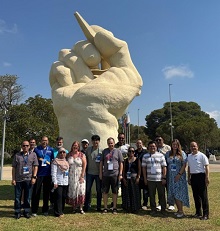
Xavier University - Ateneo de Cagayan (XU) has taken a significant stride in its commitment to addressing natural hazards through digital innovation with the successful launch of the first Academic Working Session on DIGIHAZ Design Workshop and Management Meeting for its SCOPE-HE project, “DIGIHAZ (Digital Transformation of Hazards).” Hosted by the University of Alicante (UA) in Spain, this pivotal session convened key collaborators from University of West Attica (UNIWA), Greece and across ASEAN, including Universiti Sains Malaysia, Universiti Utara Malaysia, and the University of the Cordilleras, to shape the future of disaster risk reduction through advanced digital technologies.
Representing Xavier Ateneo at this crucial gathering were Dr Hercules Cascon, the Project Leader; EnP/Engr Jefferson Vallente Jr, the Program Manager; and Dr Shiella Balbutin, Project Work Package Head and Director of the Office of International Cooperation and Networking (OICN). Their active participation underscored XU's dedication to this collaborative initiative.
The sessions, expertly facilitated by the UA and UNIWA, focused on the meticulous design of the PhD in Digital Transformation for Natural Hazards (PhD in DigiHaz). This cutting-edge doctoral program is poised to equip a new generation of experts with advanced digital skills, including big data analysis, machine learning, the Internet of Things (IoT), and computational modeling, all geared towards enhancing natural hazard modeling and disaster risk reduction strategies.
The DIGIHAZ project is a flagship initiative funded by the European Union's Global Gateway initiative, a strategic effort to boost smart, clean, and secure connections worldwide, including in education and research. The project is implemented by Nuffic, the Dutch organization for the internationalization of education, and co-implemented by DAAD (German Academic Exchange Service), reflecting a strong European commitment to international academic collaboration.

Through its focus areas, the DIGIHAZ project is set to deliver several impactful outcomes:
- Strengthened Research Ecosystems: The project will significantly enhance the research production, management, and research-informed teaching capabilities within the participating Higher Education Institutions (HEIs). This will result in more robust research infrastructures and a greater capacity to generate impactful knowledge relevant to natural hazard mitigation.
- Enhanced Knowledge and Curriculum Development: By fostering deeper links within ASEAN and between ASEAN and EU universities, DIGIHAZ will facilitate the co-creation of new knowledge and the development of innovative curricula. This ensures that academic programs are at the forefront of digital transformation for hazard management, producing graduates equipped with globally relevant skills.
- Deepened Internationalization of Higher Education: The project will further internationalize research and higher education within ASEAN and between the EU and ASEAN. This outcome will manifest in increased academic and research mobility, collaborative projects, and the sharing of best practices, ultimately strengthening global partnerships in addressing shared challenges.
The successful initiation of the Academic Working Session at UA underscores XU's pivotal role in this international endeavor. As natural disasters continue to pose significant threats, exacerbated by climate change, the DIGIHAZ project represents a proactive and collaborative step towards building more resilient communities through digital transformation and advanced academic expertise. The multi-stakeholder approach and the focus on a specialized PhD program highlight the commitment to creating lasting impact and fostering innovation in disaster risk reduction across the ASEAN and EU regions.
For more information on the SCOPE-HE program and the DIGIHAZ project, please visit:
- Xavier University's announcement: https://www.xu.edu.ph/xavier-news/226-xu-ateneo-news-ay-2024-2025/7270-xu-embarks-on-groundbreaking-scope-he-project-tackling-natural-hazards-through-digital-transformation
- Nuffic's SCOPE-HE page: https://www.nuffic.nl/en/scope-he
- DAAD's SCOPE-HE information: https://www2.daad.de/downloads/foerderprogramm/file.php?id=8937
- University of Alicante DIGIHAZ project page: https://www.old.ogpi.ua.es/project/DIGIHAZ/